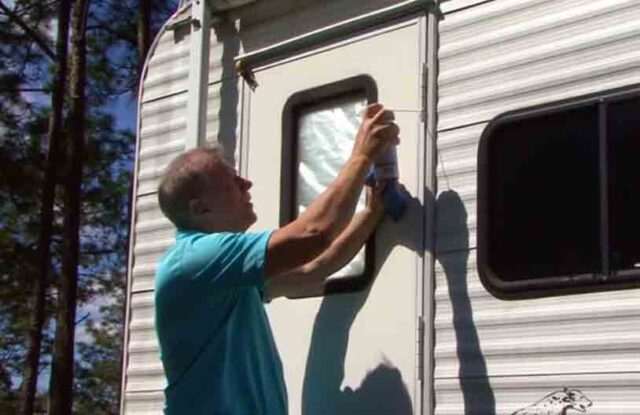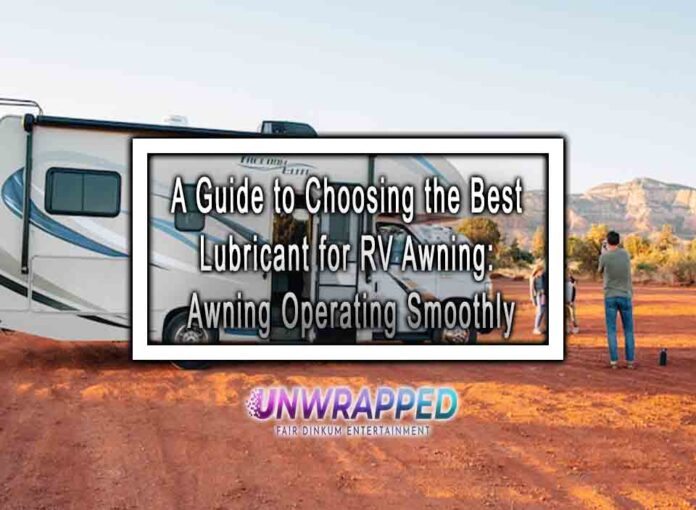RV awnings are essential to protect you from the elements while on a camping trip. They provide you with a comfortable area to relax and enjoy the scenery without being subjected to the harsh sun or rain. However, no matter how well-manufactured your RV awning is, it may start to wear and tear over time, and ultimately, it may stop working without proper maintenance.
One of the essential maintenance steps for your awning is lubrication. Lubrication can help reduce friction between the moving parts, preventing them from rusting or seizing. However, choosing the right lubricant for your RV awning can be challenging, given the various types of lubricants available on the market.
Here, we’ll provide tips on how to keep your RV awning operating smoothly by choosing the best lubricant. We will discuss the different lubrication options, including spray, silicone, and dry lubricants, and the factors to consider when selecting the best type.
Consider the Type of Material your RV Awning is Made
Before choosing the best lubricant for your awning, it is important to consider the type of material your RV awning is made of. This knowledge will ensure that you choose a lubricant that is safe and effective for your awning.
RV awnings are commonly made of two materials: vinyl and acrylic. Vinyl awnings require different lubricants than acrylic ones, and using the wrong type of lubricant can cause staining or damage to the awning’s material.

It is recommended to consult your RV awning’s manual or manufacturer’s recommendations to determine the material type and the appropriate lubricant to use. Taking this important step can help prolong the life of your RV awning and keep it operating smoothly.
Evaluate the Camping Climate and Weather Conditions
Before setting up your RV awning, it is important to evaluate the camping climate and weather conditions. This will help determine the best lubricant to use on your awning for optimal performance and protection against harsh elements.
If you are camping in an area with high humidity, for instance, you may want to consider using a silicone-based lubricant that is resistant to moisture and corrosion. Similarly, if you are camping in a dry and dusty environment, a dry lubricant like a graphite spray or talc powder may be more appropriate.
By taking into account the camping climate and weather conditions, you can keep your awning operating smoothly and prolong its lifespan.
Familiarize Yourself with the Various Types of Lubricants Available
When it comes to keeping your RV awning operating smoothly, one of the most important factors to consider is the type of lubricant you use. Before selecting a lubricant, it is important to familiarize yourself with the various types that are available to ensure that you choose the best option for your specific needs.
Some of the most common types of lubricants used on RV awnings include silicone, white lithium grease, and dry lubricants. Each has its own unique properties and benefits, and it is important to understand these differences in order to choose the right lubricant for your awning.
Taking the time to research and select the proper lubricant can help to keep your RV awning operating smoothly and efficiently for years to come.
Consider the Ease of Application and Clean-Up of the Lubricant
When selecting the best lubricant for your RV awning, one important aspect to consider is the ease of application and clean-up. Applying the lubricant should not be a hassle, and should not require special equipment or expertise. Look for a product that comes with a convenient applicator, which makes it easy to apply the lubricant evenly and precisely.
Additionally, choose a lubricant that can be easily wiped off using a dry cloth, without leaving any sticky residue or stains behind. This not only ensures a clean awning, but also helps prolong its lifespan by preventing dirt and dust from accumulating on the lubricated surfaces.
By prioritizing ease of application and clean-up when selecting a lubricant between Bio-Kleen vs Camco, you can keep your awning operating smoothly and hassle-free for years to come.
Make sure Lubricant is Compatible with Your RV Awning Model Manufacturer Instructions
Choosing the right lubricant for your RV awning is crucial to keep it operating smoothly over time. When it comes to selecting a lubricant, it is important to follow the manufacturer’s instructions and ensure that the product you choose is compatible with your RV awning model.
By doing so, you can avoid damaging your awning and potentially voiding the warranty. It is also important to keep in mind that not all lubricants are created equal and some may be more effective than others in certain conditions.
Therefore, it is best to do your research and choose a high-quality lubricant that is specifically designed for use on RV awnings to maximize its performance and longevity.
Make sure to read the product labels thoroughly and follow the application instructions to ensure that the lubricant is applied properly. Taking these steps will help you keep your RV awning operating smoothly for years to come.
Overall, taking good care of your RV awning is essential to ensure that it operates smoothly and lasts for a long time. Selecting the right lubricant can help keep your awning in top condition and protect it from damage caused by harsh weather and frequent use.
When choosing a lubricant, consider factors such as the material of your awning, the climate you will be using it in, and the type of lubricant you prefer. With the right lubricant and regular maintenance, you can extend the life of your RV awning and continue to enjoy your outdoor adventures for years to come.










